14 Ultimate Winter Spices To Keep You Warm
Home » Indian Cooking Blog » Spices » 14 Ultimate Winter Spices To Keep You Warm
Stock up on these readily available warming winter spices good for cold and strengthen your immune system against the winter bugs.
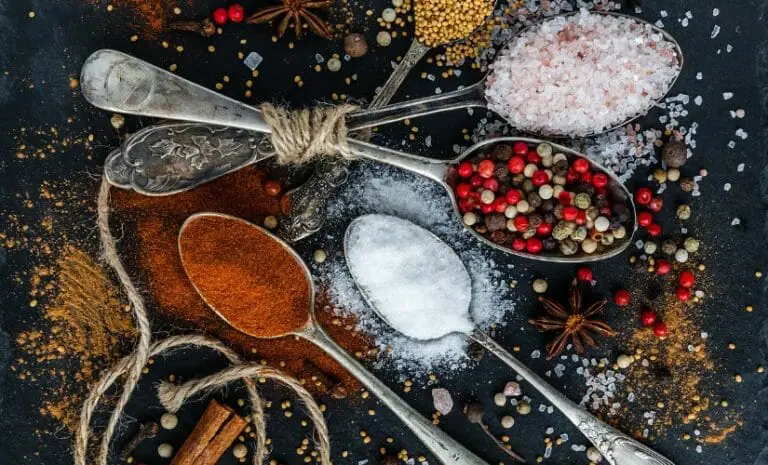
Have you noticed how the warming smell of particular winter spices such as cinnamon, cloves in a citrus brew in the air uplifts our mood and makes it feel Christmasy and cozy.
The change of temperature from mild to freezing during winter months can have a negative impact on our health as well as mental well being.
The best defense against cold or cough is to ensure you are taking the right foods that build up your immunity.
Cold and flu is a viral infection, meaning there is not much a doctor or medication can do to help.
By adding certain healthy immunity-boosting spices and herbs into your daily diet you are less likely to fall ill and even if you do, the chances of you to recover are better and faster.
This post lists the top 14 easy to find warming spices and herbs that have an abundant of health benefits apart from spicing UPP your daily winter stews and bakes.
What Are Warming Spices
All spices and herbs have specific characteristics. They are charaterised per their taste, appearance as well as the affect they have on our body.
While cooling spices such as mint, coriander spice as well as leaves, help in bringing down the body temperature from within, warming spices on the other hand stimulate circulation.
This helps in maintaining a healthy body temperature that can lead to better digestion, immune- enhancing effects to fight congestion and cough as well us make us feel less lethargic during cold winter days.
In short warming spices are inherently warm and impart their warmth to us and bring us comfort apart from also being laden with healthy microbial properties.
Best Winter Spices and Herbs List
Here is a list of warming spices according to Ayurveda that are best spices for cough and colds.
Here is a list of Ayurveda backed best spices for cold, that helps to give relief and minimize symptoms associated with the onset of a cough or cold such as a runny and stuffy nose, sore throat, irritation.
Apart from these regular immunity-boosting spices, I ensure to also include the winter spices during the cold months into our everyday meals.
These spices are so common that you can buy them easily from any supermarket.
By slightly changing the types of spices and herbs added to foods, and being more regular with taking soups, stews and herbal spice teas during chilly winter days will help keeping your health well.
Here are my recommended Top 7 winter spices that are good for colds and coughs:
1. Turmeric
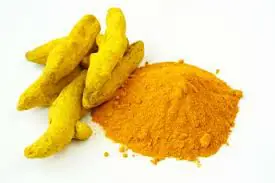
Researchers have been studying the numerous benefits of Curcumin compound present in turmeric.
It is said to have anti-inflammatory, antiviral, antibacterial, antifungal and anticancer properties.
Turmeric helps combat cold and cough, especially effective if you suffer from dry and painful cough.
The anti-inflammatory properties also help in soothing sore throat.
You can read the benefits of Turmeric and tips to use it for cooking here.
How to add turmeric in food to relieve cold symptoms
The benefits of drinking turmeric milk are many and it is so easy to make.
- Add 1/2 teaspoon of turmeric to warm milk, add honey and drink up for quick relief from cold symptoms.
- Turmeric can be added to eggs, marinades, fish, meat, curries and stir-fries for not only making the food look appetizing but also beneficial.
2. Cinnamon
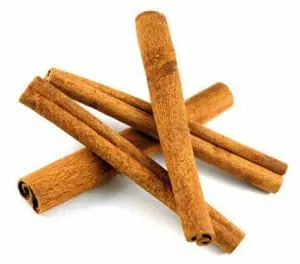
Perhaps one of the most popular and commonly used spice in any cuisine.
Cinnamon helps to stimulate blood making our body warm.
It is a good cold reliever and expectorant. It helps to reduce congestion, dislodge phlegm and dry runny nose.
How to add cinnamon in food to relieve cold symptoms
- Add a stick of cinnamon to warm water and bring to boil. Drink 1/2 cup of cinnamon water with a teaspoon of honey 3-4 times a day.
- Alternatively, you can also use a pinch of cinnamon powder to warm water and drink with added honey.
- Add a pinch of cinnamon to muesli, milk, cereal, stews and soups.
3. Cloves
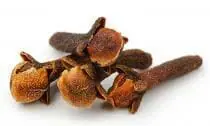
Cloves have the most amount of antioxidants per gram.
Ayurvedic medicines rely on cloves for curing or as a remedy for most health ailments.
You know you are getting your antioxidant fix if you add just 4-5 buds of cloves.
Cloves also act as an expectorant and help clear stuffy nose.
Inhaling few cloves wrapped in a cotton cloth helps to clear a blocked nose.
You can read the benefits of Cloves and tips to use it for cooking here.
How to add cloves in food to relieve cold symptoms
- Make a soothing tea with cloves and cinnamon and drink with honey, 2-3 times a day.
- Add cloves to rice dishes, stock and dessert.
- You can also use clove oil for salad dressings.
4. Black Pepper
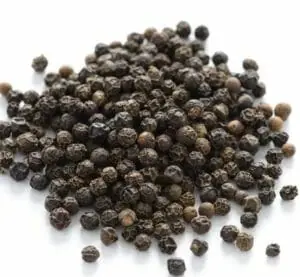
Other than containing antioxidants and antibacterial properties, black pepper is rich in vitamin C. And we all know what that means.
Vitamin C is the cold-fighting ace. It is important to include foods that contain vitamin C on a daily basis as our body does not store this vitamin therefore it is recommended to maintain levels for healthy growth tissues.
It helps to alleviate chest congestion and blocked nose.
How to add black pepper in food to relieve cold symptoms
- Black pepper mixed with honey is an age-old Indian cold remedy syrup. Honey serves as a natural cough suppressant while black pepper contains antibacterial properties.
- Black pepper can be added to any food items, from vegetables to meat, fish and even drinks.
- Try buttered toast with black pepper. You will be amazed by the taste.
- Simply crush them directly onto any savoury food.
5. Chillies & Paprika
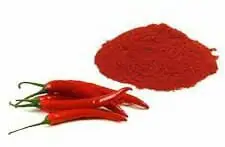
Capsaicin present in chilli peppers is known to have many health benefits.
The heat generated from eating chillies helps to decongest and clear nasal passage.
A word of caution is to avoid eating chillies if you have throat infection as chillies can irritate the already inflamed throat.
How to add chillies in food to relieve cold symptoms
- Just like black pepper, chilli can be added to any food items.
- Add it to your pasta dish, avocado toast, eggs, marinades, oil, salad just about anything for a spicy hot kick.
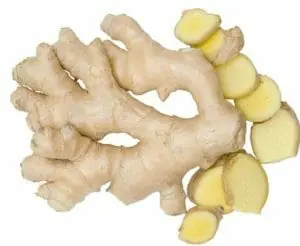
Technically not a spice but ginger powder can also be used in place of fresh ginger. (although I prefer the real thing as it has much more to offer)
6.Ginger
It has anti-inflammatory capability and helps in fighting throat and chest infection.
Ginger also inhibits the growth of toxins and helps the body to absorb essential nutrients strengthening our immunity system.
How to add ginger in food to relieve cold symptoms
- Ginger is a perfect spice to use to make many festive treats such as ginger biscuits, ginger cake, soups etc.
- Add a stick or teaspoon of grated ginger to your stews, marinades, curry or even omelette.
- Fresh ginger tea is a sure shot winter pleasure.
7.Green Cardamom
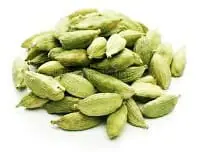
Apart from being an instant flavour enhancer, green cardamoms are full of antioxidants, vitamin C and other essential nutrients.
Belonging to the ginger family, it helps to warm the body and keep cold and cough symptoms at bay.
Eating and inhaling the aroma of green cardamom is said to clear nose and chest congestion, while the citrusy fresh aroma of cardamom helps to uplift your mood
Green cardamom is a versatile and flexible spice that can be added to dishes.
How to add green cardamom in food to relieve cold symptoms
- Add whole or powdered cardamom to rice and lentils based dishes.
- They can also be added to enhance the flavour of stews, marinades and broth.
- Add cardamom to milky teas for flavour and benefit.
8. Nutmeg
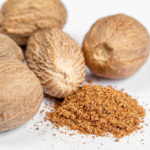
Do not underestimate the health benefits of this unassuming looking spice. In my humble opinion it is one of the go-to spice to beat the winter blues.
Nutmeg has been used from the middle ages for curing many health disorders including depression.
With an abundance of anti-oxidant properties, nutmeg has been used as a natural alternative to provide relieve to babies and toddlers suffering from chest infection.
How to add nutmeg in food to relieve cold symptoms
- Make a paste of nutmeg powder and use it as a rub on your chest and feet.
- Add nutmeg to drinks such as smoothies, shakes, milk, teas
- Add nutmeg powder to curries, stews,
9. Star Anise
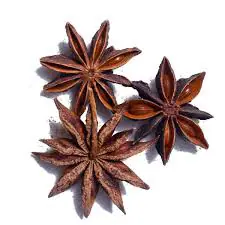
Being rich in antioxidants and vitamins A and C, star anise is said to be one of the spices effective in easing sore throats and colds.
The hugely beneficial Shikimic acid being one of the main compound present in star anise has made it a popular medication to treat influenza.
It comes as no surprise that the use of star anise goes back into treating many ailments in Chinese medicine.
How to use star anise in food to relieve cold symptoms
- Being a popular spice in the South Asian cuisine, you can use star anise for making pho style noodle soup, broths and stews.
- Add whole flower to curries and even rice dishes.
- Add to drinks and oils to infuse it with the flavours and health benefits.
10. Thyme
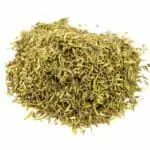
You may have tasted the mild flavour of thymol, an active and beneficial agent present in Thyme in some mouthwashes, toothpastes and cough drops.
Due to its antibacterial, anti fungal and spasmolytic properties, herbalists have used thyme to help with symptoms related to bronchitis and spasmodic cough. It is a great expectorant, helping the body to eliminate accumulated mucus.
How to add thyme in food to relieve cold symptoms
- Add few springs of thyme in hot boiling water to make tea.
- You can also add thyme to roast chicken, vegetables or while cooking fish.
- Use dried thyme leaves in stir fries, roasts, stews and soups.
- Add thyme leaves to breads.
11. Oregano
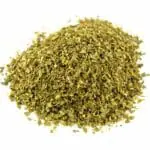
Oregano in another such herb that does more than just be a seasoning for your pizza and pasta sauce. It is said to have antifungal, antibacterial properties that help to relieve respiratory discomfort.
Although oregano oil is touted to have more impact, there is not enough evidence to support the benefits of the herb as a cold and flu remedy.
The chemical constituents, Carvacrol and Thymol present in the essential oil’s is said to place the herb as a medicinal herb prescribed by the Greek physicians in ancient times.
How to use oregano in food to relieve cold symptoms
- Use fresh oregano leaves to make pesto sauce and use for dips, spreads and dressings.
- Add dried oregano leaves to breads, roasts and sauces.
- Infuse liquids, oils, butter, broth with oregano
- You can put a little oregano leaves in a muslin cloth and use it as a nasal vapour.
12. Sage
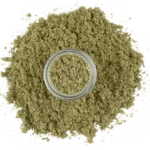
You may have seen sage tea bags been sold in the tea section of the supermarkets. Known to have antimicrobial, antiseptic and antiviral properties, sage is known to kill the bacteria that causes sore throat and give comfort.
The astringent properties present in sage, helps to sooth irritated mucous membranes.
However, you should avoid sage if pregnant and nursing.
How to use sage in food to relieve cold symptoms
- Boil sage leaves in water and drink sage tea 2-3 times a day.
- You can also inhale the steam created my boiling sage in the water to dislodge trapped phlegm.
- Add sage to stuffings.
13. Licorice Root
Licorice root has been used in both Eastern as well as Western traditional medicine. It is a powder-house of rich compounds, licorice acts as a demulcent, soothing irritating sore throat as well as an expectorant,to help get rid of phlegm.
You can easily buy licorice candy sold in stores as cough drops.
How to use licorice root in food to relieve cold symptoms
- Simmer 1 tsp of the root (dried and sliced) in 1.5 cup of water for 10 minutes and strain. Drink licorice tea 2 to 3 times a day for up to 7 days for relief.
14. Garlic
Technically a bulb and not classified as a herb, garlic has antiviral and antimicrobial properties that is said to be useful for cold and coughs.
Renowned for its antimicrobial abilities, there are been few studies conducted to show the effectiveness of garlic for both preventing and addressing upper respiratory infections.
It is readily available and an affordable aromate or spice that anyone can buy and use.
How to use garlic in food to relieve cold symptoms
There are numerous ways to use garlic in food. Few ideas are:
- Use garlic in stews, curries, stir fries.
- You can make garlic oil by infusing raw cloves of garlic in a jar of oil.
- Make garlic butter by roasting and crushing garlic and adding it to regular butter.
Why Should You Use Winter Spices
The harsh changing of climate from milder days to near freezing temperatures take a tole on all living beings be it vegetation, human race and even the animal kingdom.
Ages ago, before the advancement of medicine people resorted to healthy natural treatments to cure ailments much of which involved using spices and herbs.
Medical advancement and quick fixes, have seen a decline in the use of natural remedies to protect and cure diseases.
Not long ago my grandma would feed me a revolting indigestion busting gloop made with asafoetida, one of the best ayurvedic spice and warm water.
I literally chocked while drinking that but in 10 minutes I was ready to eat another two doughnuts!!
Research and studies show that anti-viral medicines and jab do little to improve or shorten the length of viral attack occurrence.
The ancient study of Ayurveda has advocated the use of spices as effective homemade remedies to strengthen our immunity from inside.
Spice and herbs have high antioxidants and antimicrobial properties which naturally enhance their medicinal properties and provide resistance to fight against diseases.
Besides adding flavour to food, adding herbs and spices that are warming will help you and your family fight those annoying winter blues!!
Homemade Indian Tea For Cough
Teas, soups and warm drinks are the go to comfort blanket when down with annoying cough, painful sore throat and a runny nose.
There are many different types of winter warming teas that you can choose from.
Here is a Kadha tea recipe based on the principles of Ayurveda that uses winter spices & herbs to combat coughs and cold.
It is a very common drink in many Indian households and is considered as one of the best natural remedies for cold.
Drinking a cup or two of warm kadha everyday before bedtime or even during the day helps to build your immunity system and protect your body against seasonal infections.
This Indian Kadha for cough recipe can be made easily at home with some of the winter spices listed above.
Best Winter Spices and Herbs List – Infographic recap
With the onset of winter, I do not think there will be any family devoid of cold bugs.
Although it may not be possible to totally avoid flu and viruses, adding winter spices to your meals will help in fighting them much quicker and get faster relief.
You do not need to do anything special or make extra dishes to add these spices. They can be easily added to your steaks, pasta sauce, soups and stews.
Here is a recap of the best warming spices for cough and cold that you can add to your everyday meals.
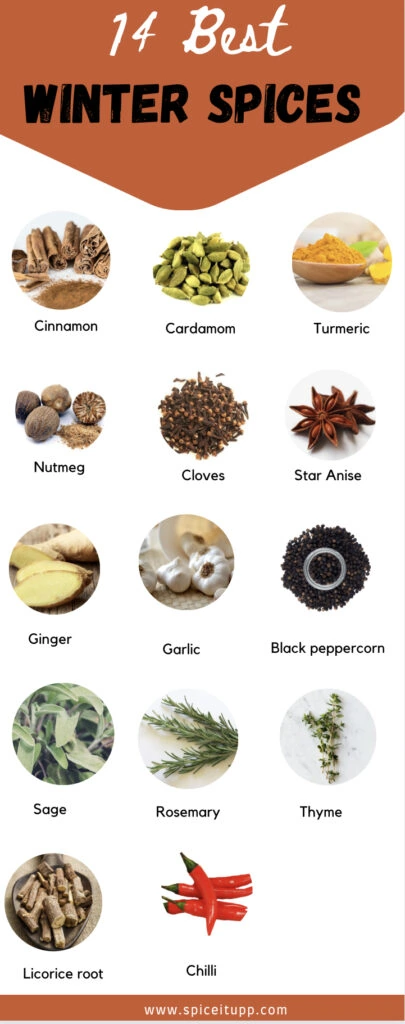
Thankful for every click to share:
Related Posts
1 1 vote Article Rating A staple in South Asian cuisine, the uses of cloves... ...
There are those odd occasions where you may have misjudged the heat of chilli ...
Fenugreek leaves is a herb that may not be readily available everywhere. Here ...
To rate click on stars
Related Posts
1 1 vote Article Rating A staple in South Asian cuisine, the uses of cloves... ...
There are those odd occasions where you may have misjudged the heat of chilli ...
Fenugreek leaves is a herb that may not be readily available everywhere. Here ...

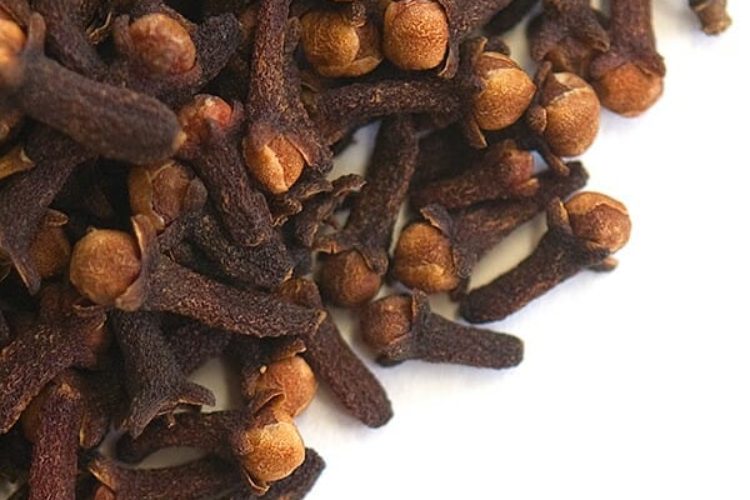
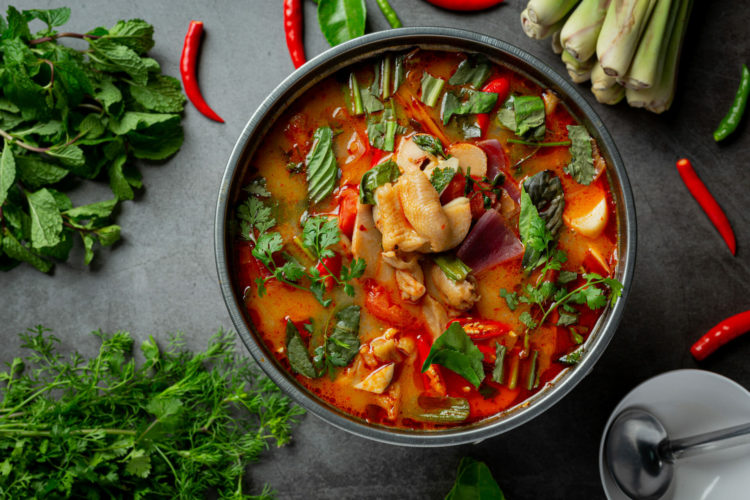
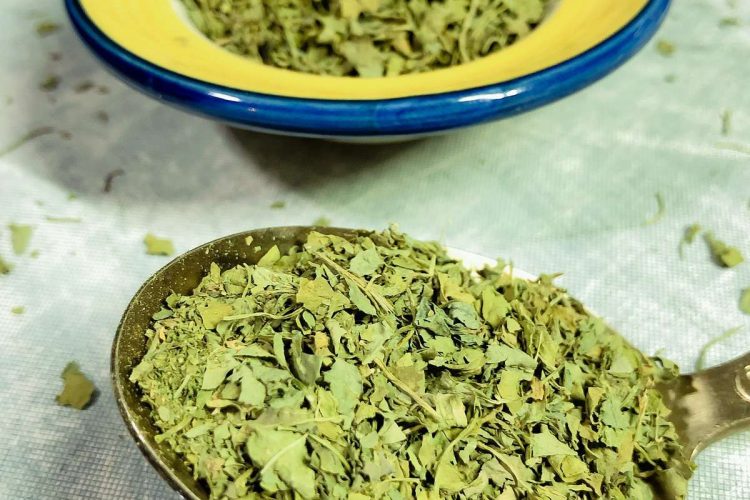
This is a great resource for the season! Thanks for the info!
Loved reading such an informative post! Going to stock up on these this season, indeed!
Very useful information! Thank you.
Thank you Bob for your comment. Glad you enjoyed the post.
Absolutely Love your Blog!! The recipes are quite easy to make and a must try for the winters.
Thank you for your very kind comment. So glad that you find the blog helpful.